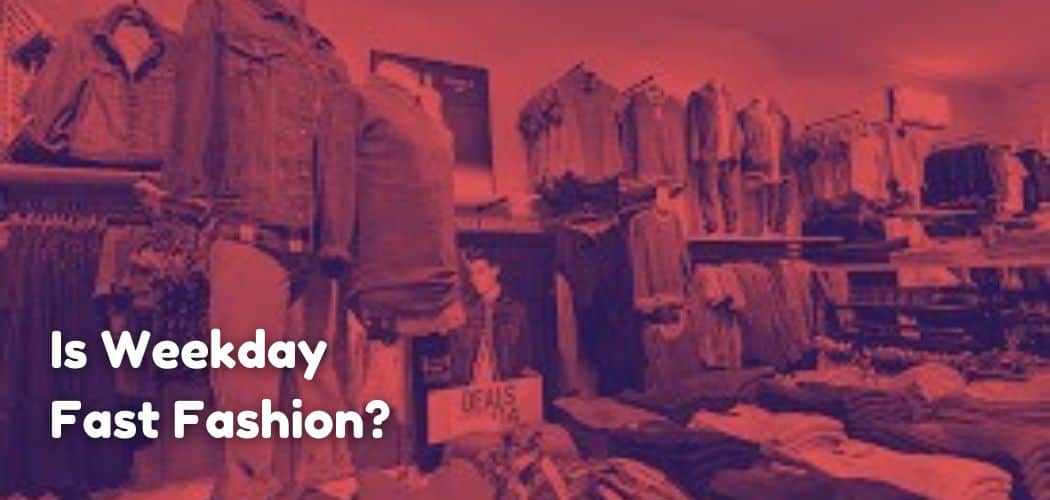Unfortunately yes, Weekday is a fast fashion company! It has recently gained popularity as a streetwear brand which releases collections at a rapid pace.
Fast fashion has gradually spread its roots all over the world. Such brands are everywhere! You may find a fast fashion store at your nearest mall. Because they have increased in number, people are forced to buy from them.
However, they fail to realize that fast fashion is having a negative impact on our environment. It’s driving our ecosystem into destruction because of pollution, wastage, and climate change.
On the other hand, many people are starting to realize this problem and are making a conscious effort to shift towards brands that are more sustainable. It’s difficult to find a good, ethical, and sustainable brand in a swarm of fast fashion stores.
But don’t you worry, I’ll help you out! In this article, I’ll be discussing how the brand Weekday is a fast fashion one.
Let’s get right to it!
Is Weekday really fast fashion?
I know that you may not like hearing this, but yes Weekday is a fast fashion brand. This is because it’s a part of the H&M group since 2008.
H&M is one of the leading fast fashion stores in the world today. In fact, it’s the second largest retailer in the world which operates in 74 countries.
Its popularity is as huge as its rate of production. H&M sells about 3 billion garments every year. It is proud to be a fast fashion company.
Weekday is a Swedish fashion brand which was founded in 2002 and operates in 18 markets all over the world. It has 33 stores in over nine countries.

They create clothing for men and women and they also sell collections from external brands. As it’s a part of the H&M group, this brand is also a fast fashion one.
The brand releases new arrivals and trendy styles on a regular basis. This means that they also produce so much waste which ends up in piles in landfills.
These brands are known for using cheap raw materials which aren’t sustainable. Therefore, the waste in landfills cannot biodegrade and has to be burned, leading to greenhouse gas emissions.
Moreover, another factor which determines that it’s a fast fashion brand is its producing countries.
Weekday manufactures in poor Asian countries. This is an important aspect of fast fashion brands.
No matter how much fast fashion brands try to be eco-friendly, they’re still responsible for the harm caused to our planet.
It is high time that brands like Weekday and H&M start addressing these concerns!
Is it ethical?
It’s difficult to regard any fast fashion brand as an ethical one. This is because of the negative impact they have on our ecosystem.
However, there are many other factors which determine whether a brand is an ethical one or not. An ethical brand doesn’t cause any harm to humans, animals, or the environment. They are also responsible for taking decisions for the betterment of the planet.
Weekday has an entire page dedicated on their website which states the responsibility they have over the planet.
They admit that the fashion industry isn’t sustainable and they also claim to take measures which would help them become more sustainable.
97% of their materials are either recycled or sustainably sourced. They also aim to reach net zero by 2040 and are working towards adopting a more circular business model. This would help them minimize their wastage.
The brand also has an approved policy by CanopyStyle to help prevent deforestation of ancient and endangered forests.
While they’ve definitely stated the measures they’re taking to become more sustainable, it’s uncertain whether they’re on track or not.

As a fast fashion brand, it offers new items and encourages the rotation of fashion trends. It creates a need for overconsumption, which leads to several other problems.
Weekday focuses on integrating more responsible materials into their collections, such as organic cotton, recycled polyester, and viscose.
The brand received a score of 61 to 70% in the fashion transparency index. While this may be good, it should be noted that as it’s a part of the H&M group, there isn’t any separate information on this brand.
Rather, the H&M group publishes a single sustainability report which includes labor conditions, policies, and other practices. This report represents all brands that come under the H&M group. So even its transparency isn’t enough!
Weekday also has a project to help improve living wages, but at this point, it’s unclear whether they’re paying a living wage to its supply chain or not.
Another factor which determines an ethical brand is its animal welfare policies. It’s good to know that Weekday has a formal animal welfare policy.
It is against the use of fur, Angora, or exotic animal skin. However, they still make use of wool but even this is accredited by responsible standards.
We can say that the brand is ethical also because it’s PETA proved as vegan. It has certifications from ethical trading initiated as well as science based targets initiatives.
Weekday’s sustainability commitments are commendable, however, the brand is still a fast fashion one. This means it churns out several styles at low prices.
The brand is also found to be greenwashing the public, which means that they are marketing themselves as eco-friendly, but in reality they’re not.
Keeping the above in mind, we can’t regard Weekday as an ethical brand!
Where does it get their clothes?
The Swedish brand was influenced by youth culture and street style. It is manufactured in several countries all over the world.
These include Turkey, China, India, Myanmar, Bangladesh, Indonesia, and Cambodia.

Many fast fashion brands tend to opt for these countries because of their loose environmental regulations. They get away with producing clothes without having to deal with any legal complications.
However, this also makes the brand unethical because these countries are known to exploit labor and not pay a living wage.
Although the H&M group has definitely upgraded its game and is trying to change for the better, it still wants to be a leading company in the fast fashion world.
Their practices aren’t ethical and also pose a risk to the environment as well as people!

